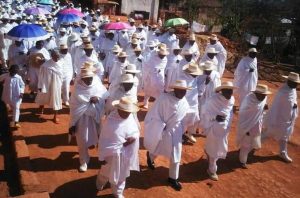The peace and compassion, freedom and dignity championed by Jesus of Nazareth, are ideals that give purpose and meaning to human existence. Slavery, the selling or abduction or control of humans for exploitation, of any kind by any means is a deprivation of what makes us preciously human – thoughtful free choice. When this unique attribute of personal freedom to choose is taken away, that is a crime against the person.
It is free choice that sets us apart from all other living creatures. When it is taken from us, our human dignity is diminished, our rights are denied, and we are being treated as less than human. That’s why the captivity that goes with human trafficking is devastating to human beings. Their self-esteem is taken from them and their will to live is weakened. Many turn to suicide as a result. Without the freedom to choose, to exercise free will, to decide for oneself how and where to live without the chains of debt, paralysing fear and threats, the helpless captive is reduced to the state of the silent caged bird, the chained creature.
When Jesus declared that his mission was to fulfil the promise and prophecy of Isaiah to uplift the poor, open the minds and hearts of those blinded by tradition and ignorance, and declare a Jubilee year where all captive slaves would be freed and debts be cancelled and forgiven and land would be returned to its rightful owners, there was an angry uproar from the elders, landowners and the wealthy.
His message was clear to the astute teachers of the law and the biblical scholars. To them, he was going to turn the power structure of society on its head, deliver it to the poor and the downtrodden and give power to the freed slaves. The rich were outraged, and the poor were delighted.
The mission statement of Isaiah was adopted word for word by Jesus. In the synagogue of Nazareth, he was invited to read the scripture. He opened the scroll, looked for the passage from Isaiah and read,
“the Spirit of the Lord is upon me, because he has chosen me to bring the Good News to the poor. He has sent me to proclaim liberty to the captives, and recovery of sight to the blind: to set free the oppressed and announce that the time has come when the Lord will save his people”. (Luke 4:16-19).
No wonder the authorities were outraged. What an audacious, arrogant statement to make. We can imagine their response, “Who is this son of a carpenter to claim he is equal to the great Isaiah and that he would implement and fulfil the prophet’s mission?”
This was pure fantasy if not blasphemy to them. But, it was also dangerous and subversive. Talk of freeing captives and slaves was treason to the Romans, and the proxy rulers of Palestine feared losing their religious power and wealth if they lost their positions. It was much like today’s world, run on the bonded labour of an estimated twenty million people.
Advocating openly for equality and freedom for the captives and the poor was a dangerous mission. Jesus’ challenge to the system and denunciation of corrupt hypocrites eventually led to his execution.
While the Sermon on the Mount was a powerful social and spiritual declaration for the rights of the poor, he taught most forcibly by example. He washed his disciples feet and called them friends, not servants. He fed the hungry, healed the sick, opposed child abuse said that it was the children that were the most important (Matt.18;1- 8)
He related, as a concerned friend, to the downtrodden and the rejected. He established before the world their worthiness as God’s children and their inalienable rights to be free from all bondage, imprisonment, domination and control by others. Women and children are the most vulnerable – the sex trade destroys lives, and the hopes and dreams of millions.
We all need to be awakened to slavery and human trafficking. It is the worst crime against the poor and the hungry. They are seeking employment and a life of dignity, free from poverty, and too often are enslaved. We must oppose it and work for human rights and dignity.
– Fr. Shay Cullen






